-
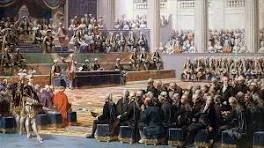 Facing crippling debt, the monarch of France, King Louis XVI assembles the Three Estates. Louis wishes to raise the taxes on the citizens of France, but law states that he can only do so with the approval of the Three Estates. However, what Louis did not predict was that the First Estate and the Second Estate would vote to only raise taxes on the Third Estate. This angers members of the Third Estate, who represent over 95 percent of the French population.
Facing crippling debt, the monarch of France, King Louis XVI assembles the Three Estates. Louis wishes to raise the taxes on the citizens of France, but law states that he can only do so with the approval of the Three Estates. However, what Louis did not predict was that the First Estate and the Second Estate would vote to only raise taxes on the Third Estate. This angers members of the Third Estate, who represent over 95 percent of the French population. -
 After the Estate general locked out the Third Estate. The Third Estate came together in what will be known as the Tennis Court Oath. Which formed the National Assembly. They will not disband till King Louis acknowledges the right to the role of a NA (National Assembly).
After the Estate general locked out the Third Estate. The Third Estate came together in what will be known as the Tennis Court Oath. Which formed the National Assembly. They will not disband till King Louis acknowledges the right to the role of a NA (National Assembly). -
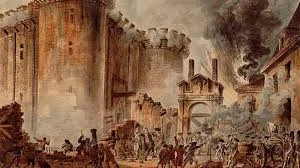 After Louis fire the finance minister, Jacques Necker, who was in favor of the National Assembly. The French people met up all throughout Paris. The morning of July 14, 1789, the city of Paris was in a state of pandemonium. At this point the Bastille was almost dry of the weapons it had. This is one of the most important events in the French Revolution.
After Louis fire the finance minister, Jacques Necker, who was in favor of the National Assembly. The French people met up all throughout Paris. The morning of July 14, 1789, the city of Paris was in a state of pandemonium. At this point the Bastille was almost dry of the weapons it had. This is one of the most important events in the French Revolution. -
 Women were on the verge of rioting in the Paris marketplace due to the high price of bread. Famine was a major concern of the people. The morning of October 5th, the 11 mile long march began both men and women started to gather it grew to over 7,000 people. Fighting ended swiftly. Due to the march , the monarchists lost any power they had left.
Women were on the verge of rioting in the Paris marketplace due to the high price of bread. Famine was a major concern of the people. The morning of October 5th, the 11 mile long march began both men and women started to gather it grew to over 7,000 people. Fighting ended swiftly. Due to the march , the monarchists lost any power they had left. -
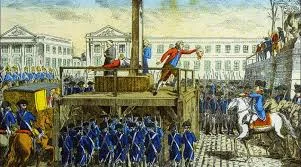 After the King and Queen tried to escape from Paris they were called to execution. King Louis was sent to the guillotine on January 21, 1793. After a few months Marie Antoinette met the same fate on October 16.
After the King and Queen tried to escape from Paris they were called to execution. King Louis was sent to the guillotine on January 21, 1793. After a few months Marie Antoinette met the same fate on October 16. -
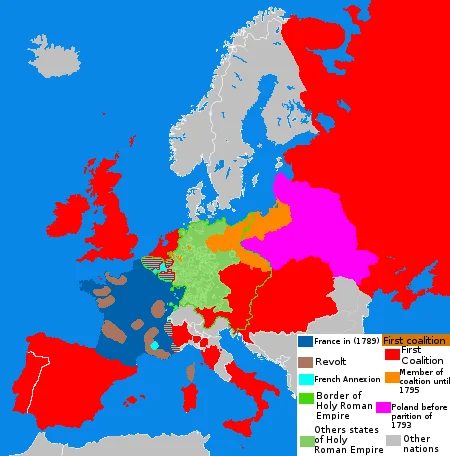 The War of the First Coalition (1792-1797) was a major European conflict where a coalition of powers, including Austria, Prussia, Great Britain, and others, aimed to contain and defeat Revolutionary France, eventually ending with the Peace of Campo Formio in 1797. This is considered a part of the Napoleonic Wars period. One of 3 wars with France and the other European powers. France won his war thanks to Napoleon's leadership.
The War of the First Coalition (1792-1797) was a major European conflict where a coalition of powers, including Austria, Prussia, Great Britain, and others, aimed to contain and defeat Revolutionary France, eventually ending with the Peace of Campo Formio in 1797. This is considered a part of the Napoleonic Wars period. One of 3 wars with France and the other European powers. France won his war thanks to Napoleon's leadership. -
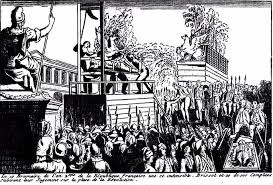 The Reign of Terror from September 5, 1793 to July 28, 1794. Was a time of mass killing headed by Robespierre. Who wanted to maintain his power under the removal of the people who wanted the monarchy back. The Terror ended when Robespierre was sent ironically to the guillotine to be killed on July 27, 1794.
The Reign of Terror from September 5, 1793 to July 28, 1794. Was a time of mass killing headed by Robespierre. Who wanted to maintain his power under the removal of the people who wanted the monarchy back. The Terror ended when Robespierre was sent ironically to the guillotine to be killed on July 27, 1794. -
 The War of the Second Coalition was the second war targeting revolutionary France by many European monarchies, led by Britain, Austria, and Russia and including the Ottoman Empire, Portugal, Naples and various German monarchies. Prussia did not join the coalition, while Spain supported France. France won the War of the Second Coalition thanks to one of the if not the best military generals in history Napoleon Bonaparte.
The War of the Second Coalition was the second war targeting revolutionary France by many European monarchies, led by Britain, Austria, and Russia and including the Ottoman Empire, Portugal, Naples and various German monarchies. Prussia did not join the coalition, while Spain supported France. France won the War of the Second Coalition thanks to one of the if not the best military generals in history Napoleon Bonaparte. -
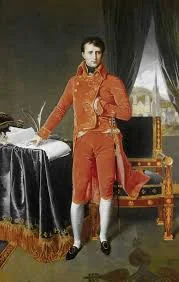 When Napoleon came back from Egypt a popular general to Paris. plotters who wanted to overthrow the 5 Man Directory. The 5 Man Director was highly corrupted and unpopularity was well known. The proposed government would (it was to be a 3 consul government but it became temporary). Napoleon would become the first consul and later the Emperor of France.
When Napoleon came back from Egypt a popular general to Paris. plotters who wanted to overthrow the 5 Man Directory. The 5 Man Director was highly corrupted and unpopularity was well known. The proposed government would (it was to be a 3 consul government but it became temporary). Napoleon would become the first consul and later the Emperor of France. -
 Napoleon Bonaparte was crowned Emperor of France at the cathedral of Notre Dame. Napoleon did this to gather his power and to show the other European powers that France is not weak and will not back down. This would have Napoleon as the Emperor of France till his exile.
Napoleon Bonaparte was crowned Emperor of France at the cathedral of Notre Dame. Napoleon did this to gather his power and to show the other European powers that France is not weak and will not back down. This would have Napoleon as the Emperor of France till his exile. -
 The War of the Third Coalition (1805-1806) was a major European conflict during the Napoleonic Wars. Pitting an alliance of nations including Britain, Russia, Austria, Sweden, Naples, and Sicily against Napoleon's France and its allies. This was one of the last of the last of the Napoleonic Wars. Napoleon won this War at the Battle of Austerlitz.
The War of the Third Coalition (1805-1806) was a major European conflict during the Napoleonic Wars. Pitting an alliance of nations including Britain, Russia, Austria, Sweden, Naples, and Sicily against Napoleon's France and its allies. This was one of the last of the last of the Napoleonic Wars. Napoleon won this War at the Battle of Austerlitz. -
 The Battle of Austerlitz, also known as the Battle of the Three Emperors, was one of the most important military engagements of the Napoleonic Wars. The battle occurred near the town of Austerlitz in the Austrian Empire. Around 158,000 troops were involved, of which around 24,000 were killed or wounded. It was fought between France against a coalition of Austria and Russia.
The Battle of Austerlitz, also known as the Battle of the Three Emperors, was one of the most important military engagements of the Napoleonic Wars. The battle occurred near the town of Austerlitz in the Austrian Empire. Around 158,000 troops were involved, of which around 24,000 were killed or wounded. It was fought between France against a coalition of Austria and Russia. -
 After Russia backed out of the Napoleons Continental System to hurt the British economy. Napoleon decided to invade Russia which was not advised by his officials. Napoleon's Grande Armée numbered 680,000 soldiers and was made up of France, Poland, Germany, Italy, and other allied states troops. Due to the use of scorched-earth tactics that made it impossible for Napoleon to live off of the land. Along with hit and run tactics Napoleon lost an estimated 380,000 troops in his defeat.
After Russia backed out of the Napoleons Continental System to hurt the British economy. Napoleon decided to invade Russia which was not advised by his officials. Napoleon's Grande Armée numbered 680,000 soldiers and was made up of France, Poland, Germany, Italy, and other allied states troops. Due to the use of scorched-earth tactics that made it impossible for Napoleon to live off of the land. Along with hit and run tactics Napoleon lost an estimated 380,000 troops in his defeat. -
 The Battle of Leipzig, also known as the Battle of the Nations, was fought from 16 to 19 October 1813 at Leipzig, Saxony. The Coalition armies of Austria, Prussia, Sweden, and Russia, led by Tsar Alexander I and Karl von Schwarzenberg, decisively defeated the Grande Armée of French Emperor Napoleon Bonaparte.The Battle of Leipzig involved over 560,000 soldiers. This made it the largest battle in Europe before the Somme. The number of men killed in the Battle range from 80,000 to 110,000.
The Battle of Leipzig, also known as the Battle of the Nations, was fought from 16 to 19 October 1813 at Leipzig, Saxony. The Coalition armies of Austria, Prussia, Sweden, and Russia, led by Tsar Alexander I and Karl von Schwarzenberg, decisively defeated the Grande Armée of French Emperor Napoleon Bonaparte.The Battle of Leipzig involved over 560,000 soldiers. This made it the largest battle in Europe before the Somme. The number of men killed in the Battle range from 80,000 to 110,000. -
 After the his failed invasion of Russia and the tremendous losses of his grand Armée. Along with the growing dislike of the Emperor with his wars Napoleon was forced by both outside and inside powers to give up the throne. Napoleon was sent to the island of Elba where he was watch. But he snuck away just 2 days later. This started the 100 days a time where Napoleon ruled.
After the his failed invasion of Russia and the tremendous losses of his grand Armée. Along with the growing dislike of the Emperor with his wars Napoleon was forced by both outside and inside powers to give up the throne. Napoleon was sent to the island of Elba where he was watch. But he snuck away just 2 days later. This started the 100 days a time where Napoleon ruled. -
 After Napoleon's exile on Elba he snuck away just 2 days later. This started the 100 days a time where Napoleon ruled. He would march his way to Paris. After the Coalition found out that Napoleon escaped from his exile on Elba. They move to France to take down Napoleon, this would lead to the Battle of Waterloo.
After Napoleon's exile on Elba he snuck away just 2 days later. This started the 100 days a time where Napoleon ruled. He would march his way to Paris. After the Coalition found out that Napoleon escaped from his exile on Elba. They move to France to take down Napoleon, this would lead to the Battle of Waterloo. -
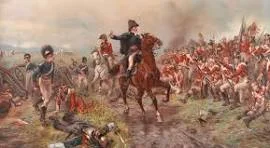 The Battle of Waterloo was the final battle of the French Revolution and it was the last battle Napoleon Bonparte ever fought in. The Battle of Waterloo was fought in present day Belgium. Napoleon’s French forces were outnumbered by the combined armies of the English and the Prussians, led by British officer the Duke of Wellington. When Napoleon was defeated, the French throne was once again given to King Louis XVIII.
The Battle of Waterloo was the final battle of the French Revolution and it was the last battle Napoleon Bonparte ever fought in. The Battle of Waterloo was fought in present day Belgium. Napoleon’s French forces were outnumbered by the combined armies of the English and the Prussians, led by British officer the Duke of Wellington. When Napoleon was defeated, the French throne was once again given to King Louis XVIII.
